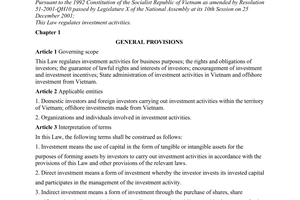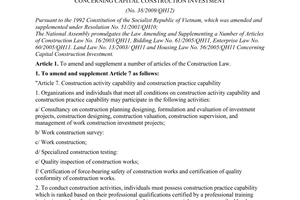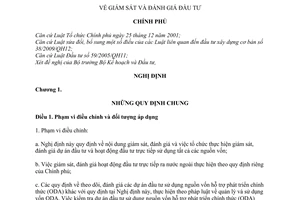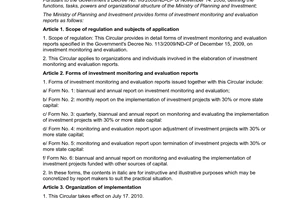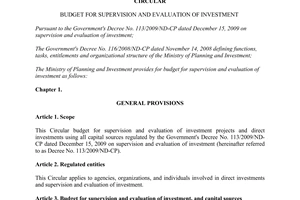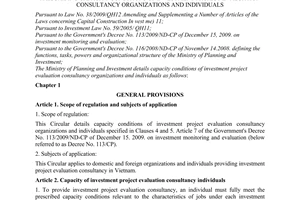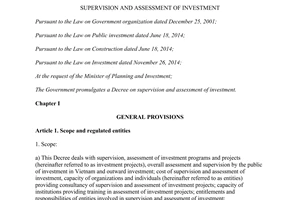Decree No. 113/2009/ND-CP on investment monitoring and evaluation đã được thay thế bởi Decree No. 84/2015/ND-CP supervision and assessment of investment và được áp dụng kể từ ngày 20/11/2015.
Nội dung toàn văn Decree No. 113/2009/ND-CP on investment monitoring and evaluation
|
THE
GOVERNMENT |
SOCIALIST
REPUBLIC OF VIET NAM |
|
No. 113/2009/ND-CP |
Hanoi, December 15, 2009 |
DECREE
ON INVESTMENT MONITORING AND EVALUATION
THE GOVERNMENT
Pursuant to the December 25,
2001 Law on Organization of the Government;
Pursuant to Law No. 38/2009/QH12 Amending and Supplementing a Number of
Articles of the Laws Concerning Capital Construction Investment;
Pursuant to Investment Law No. 59/2005/QH11;
At the proposal of the Minister of Planning and Investment,
DECREES:
Chapter I
GENERAL PROVISIONS
Article 1. Scope of regulation and subjects of application
1. Scope of regulation:
a/ This Decree provides for the contents and organization of monitoring and evaluation of investment projects and direct investment activities funded with capital of all sources;
b/ The monitoring and evaluation of offshore direct investment activities comply with the Government's separate regulations;
c/ The monitoring and evaluation of investment projects funded with official development assistance (ODA) comply with the law on ODA management and use when this Decree contains different provisions. The inspection of ODA-funded investment projects complies with this Decree;
d/ Community monitoring complies with the Prime Minister's regulations.
2. This Decree applies to agencies, organizations and individuals involved in direct investment and investment monitoring and evaluation activities.
Article 2. Interpretation of terms
In this Decree, the terms below are construed as follows:
1. Investment monitoring and evaluation means the supervision, inspection and evaluation of the level of achievement of the investment process against investment requirements and objectives. Investment monitoring and evaluation consist of monitoring and evaluation of investment projects and investment-related overall monitoring and evaluation.
2. Monitoring of an investment project means the regular supervision and planned periodical or unexpected inspection of a project's investment process under investment management regulations to assure the achievement of project's objectives and efficiency.
3. Supervision of an investment project means the regular and periodical update of information relating to the project implementation; summarization, analysis and evaluation of information and putting forward of options to management authorities at all levels for decision to ensure that the project is implemented according to its objectives and schedule, with quality and within the bounds of specified resources.
4. Inspection of an investment project means the planned periodical or unexpected inspection of the observance of project management regulations by concerned agencies, organizations and individuals; detect in time mistakes and weaknesses in project management under law; propose problems or violations of project management regulations to competent authorities for handling; and monitor the handling of the detected problems and compliance with handling measures.
5. Evaluation of an investment project means the planned periodical or unexpected determination of the level of achievement of specific objectives and targets against the project investment decision or the State-prescribed evaluation standards at a given point of time. Evaluation of an investment project consists of initial evaluation, mid-term evaluation, final evaluation, impact evaluation and unexpected evaluation.
6. Initial evaluation means the evaluation conducted right after the project implementation commences, aiming to review the project's practical situation compared to the time of its approval, so as to take handling measures right at the stage of technical designing and planning for project implementation.
7. Mid-term evaluation means the evaluation conducted in the middle of the approved project implementation duration or after finishing each phase (for a project implemented in different phases), aiming to review the process of project implementation from the time of commencement, so as to propose necessary adjustments.
8. Final evaluation means the evaluation conducted right after the project is completed, aiming to consider the project's outcomes and draw experience lessons.
9. Impact evaluation means the evaluation conducted at an appropriate point of time after the third year from the date a project is put into operation, aiming to identify the project's efficiency, sustainability and socio-economic impacts against the set objectives.
10. Unexpected evaluation means the evaluation conducted when arise unexpected problems, difficulties and impacts in the process of project implementation.
11. Investment-related overall monitoring means regular supervision and planned periodical inspection of the investment process at different levels in different sectors and localities; identification and timely remedying of wrongdoings and mistakes to ensure efficient investment is made in line with plannings and plans and according to set objectives.
12. Investment-related overall supervision means the regular and periodical update of information relating to investment activities and investment management by different levels, sectors and localities; summarization, analysis and evaluation of information and proposition of mechanisms and policies related to investment management.
13. Investment-related overall inspection means the planned periodical or unexpected inspection of the observance of investment management regulations by different levels and sectors; detection and timely remedying of mistakes and weaknesses to ensure lawful investment management; detection and reporting of arising problems or violations of investment management regulations to competent authorities for timely handling; and supervision of the handling of the detected problems and compliance with handling measures.
14. Investment-related overall evaluation means the planned periodical analysis and evaluation of investment results of the economy, sectors and localities; determination of the level of achievement compared to plannings and plans in each period or phase; analysis of causes affecting investment results and putting forward of solutions to raising investment efficiency in the subsequent period or phase.
15. Investment project funded with 30% or more state capital means an investment project with a state capital portion accounting for 30% or more of its total investment and specified in the project approval decision. The state capital portion in a project shall be determined on a case-by-case basis.
16. Investment project funded with capital of other sources means an investment project not funded with state capital or with a state capital portion accounting for less than 30% of its total investment.
17. Corporation 91 means a state corporation established under the Prime Minister's Decision No. 91/TTg of March 7, 1994, on pilot establishment of business groups.
Chapter II
MONITORING AND EVALUATION OF INVESTMENT PROJECTS
Section I. MONITORING AND EVALUATION OF INVESTMENT PROJECTS FUNDED WITH 30% OR MORE STATE CAPITAL
Article 3. Supervision of investment projects
1. Investors shall supervise an investment project through:
a/ Keeping updated the project implementation: implementation progress; performed work volume; work quality; expenses; and developments;
b/ Keeping updated the situation of project implementation management: elaboration of implementation plans; concretization of plans to implement the contents of project implementation management; implementation and adjustment of plans; and assurance of project managemeni quality and effect;
c/ Keeping updated the processing of and response to information: assurance of reporting: processing of reported information: situation and outcomes of the settlement of arising problems;
d/ Promptly reporting and proposing solutions to difficulties, problems and issues which fall beyond their competence.
2. Persons with investment-deciding competence shall supervise an investment project through:
a/ Supervising investors' observance of reporting regulations; inspecting the completeness, update and accuracy of project supervision information provided by investors;
b/ Summarizing the project implementation situation: implementation progress, capital disbursement, bidding, ground clearance, resettlement and environmental protection; major difficulties and problems affecting the project implementation;
c/ Promptly responding to and handling arising problems according to their competence;
d/ Supervising the handling of problems and the compliance with handling measures by investors;
e/ Promptly reporting on and proposing solutions to difficulties and problems and issues which fall beyond their competence under regulations.
3. Investment state management agencies shall supervise an investment project through:
a/ Supervising the observance of reporting regulations by investment deciders and investors under regulations;
b/ Summarizing the project implementation situation: implementation progress, capital disbursement and bidding; and major difficulties and problems affecting the project;
c/ Responding to and handling in time arising problems according to their competence;
d/ Supervising the handling of problems and compliance with handling measures by investors and investment deciders of the projects;
e/ Promptly reporting on and proposing solutions to difficulties, problems and issues which fall beyond their competence.
Article 4. Inspection of investment projects
1. Regulations on inspection of investment projects
a/ Investors shall themselves conduct regular inspection of their investment projects.
b/ Persons with investment-deciding competence shall:
Inspect investment projects falling within their competence at least once, for projects to be implemented for over 12 months;
Inspect investment projects upon their adjustment resulting in changes in project location, size or objectives or an increase in the total investment by 30% or more;
Conduct inspection in other cases when necessary;
c/ Investment state management agencies shall decide to conduct planned or unexpected inspection of investment projects.
2. Investors shall inspect an investment project through:
a/ Inspecting all issues related to the project implementation and management;
b/ Inspecting the observance of investment management regulations by project management units and contractors;
c/ Inspecting the project implementation management capacity of project management units and contractors;
d/ Detecting and reporting to competent authorities for timely handling difficulties, problems and violations in the process of project implementation; monitoring the handling of the detected problems and compliance with handling measures by project management units and contractors.
3. Persons with investment-deciding competence shall inspect an investment project through:
a/ Inspecting the observance of regulations on bidding; compensation, ground clearance and resettlement; use of investment capital and other resources; allocation, disbursement and payment of investment capital; settlement of problems arising in the process of project investment; test before take-over and putting of the project into operation; project management and operation; and environmental and ecological protection;
b/ Inspecting the project implementation management capacity of investors and project management units;
c/ Detecting and reporting to competent authorities for timely handling difficulties, problems and violations in the process of project implementation; monitoring the handling of the detected problems and compliance with handling measures by investors and project management units.
4. Investment state management agencies shall inspect an investment project through:
a/ Inspecting the observance of regulations on project formulation, appraisal and approval; bidding; compensation, ground clearance and resettlement; use of investment capital and other resources; allocation, disbursement, payment and finalization of investment capital; settlement of problems arising in the process of project investment; test before take-over and putting of the project into operation; project management and operation; and environmental and ecological protection;
b/ Inspecting the project implementation management capacity of investor-managing agencies, investors and project management units;
c/ Detecting and reporting to competent authorities for timely handling difficulties, problems and violations in the process of project implementation; monitoring the handling of the detected problems and compliance with handling measures by investor-managing agencies, investors and project management units.
Article 5. Investment projects subject to evaluation
1. Group-B or larger projects are subject to initial evaluation and final evaluation.
2. Projects with phased investment are subject to mid-term evaluation at the end of each phase.
3. Persons with investment-deciding competence and investment state management agencies shall decide to conduct other evaluations when necessary to suit specific requirements and conditions of each project.
Article 6. Contents of evaluation of investment projects
1. Initial evaluation:
a/ Evaluation of preparations and organization and mobilization of resources for a project, ensuring the achievement of the approved objectives and schedule;
b/ Evaluation of problems newly arising from the time of project approval; newly arising problems due to objective factors (e.g., amendments to policies and laws, or adjustments to the project to suit climate and geological conditions, etc.) or subjective factors (e.g., capacity or organizational apparatus for project implementation management, etc.);
c/ Proposition of solutions to arising problems as suitable to practical conditions.
2. Mid-term evaluation:
a/ Evaluation of project implementation outcomes against investment objectives;
b/ Evaluation of work performance by the time of evaluation against the approved plan;
c/ Proposition of necessary solutions, even adjustments to the project designs and objectives (when necessary);
d/ Lessons drawn from the project formulation, appraisal, approval and implementation management.
3. Final evaluation:
a/ Evaluation of the process of project investment preparation;
b/ Evaluation of the process of project implementation: project implementation management; outcomes of achievement of project objectives; mobilized resources for the project; the project's benefits for beneficiaries and participants; the project's impacts; sustainability and elements to ensure sustainability of the project:
c/ Lessons drawn from the project implementation and recommendations.
4. Impact evaluation:
a/ Evaluation of economic-technical operation;
b/ Evaluation of socio-economic impacts;
c/ Evaluation of environmental and ecological impacts;
d/ Evaluation of sustainability;
e/ Successes and failures in the stages of project designing, implementation and operation.
5. Unexpected evaluation:
a/ Identification of the state and nature of unexpectedly arising problems;
b/ Identification of effects and the extent of influence of arising problems on the project implementation and the possibility to achieve the project's objectives;
c/ Proposition of intervention measures, implementing agencies and deadlines.
Article 7. Organization of evaluation of investment projects
1. Investors shall organize initial evaluation, mid-term evaluation and final evaluation of investment projects.
2. Investment deciders and investment state management agencies shall work out annual plans on impact evaluation and unexpected evaluation of investment projects under their management suitable to the size and characteristics of these projects and the financial capacity of the agencies.
3. Agencies organizing evaluation of investment projects may themselves evaluate investment projects, or hire consultants, groups of consultants or consultancy organizations to do the job. Investment project evaluation expenses shall be borne by investment evaluation agencies.
4. In case of hiring the evaluation of projects, consultants, groups of consultants or consultancy organizations hired to evaluate investment projects must be fully capable of doing the job.
5. The Ministry of Planning and Investment shall guide capability conditions of consultancy organizations and individuals to evaluate investment projects.
Section 2. MONITORING AND EVALUATION OF INVESTMENT PROJECTS FUNDED WITH CAPITAL OF OTHER SOURCES
Article 8. Contents of supervision of investment projects
1. Investors shall supervise an investment project through:
a/ Keeping updated the project implementation: overall investment schedule of the project;
b/ Keeping updated the compliance with the requirements on environmental protection and use of land, natural resources and minerals under regulations;
c/ Keeping updated the implementation of the contents of the investment certificate.
2. Investment state management agencies shall supervise an investment project through:
a/ Monitoring the investor's observance of reporting regulations;
b/ Summarizing the project implementation;
c/ Summarizing the compliance with the requirements on environmental protection and use of land, natural resources and minerals under the project;
d/ Responding to and handling in time arising problems according to their competence;
e/ Monitoring the handling of problems and compliance with handling measures by investors and persons competent to issue investment certificates;
f/ Promptly reporting on and proposing solutions to difficulties, problems and issues which fall beyond their competence.
Article 9. Contents of inspection of investment projects
1. Persons competent to issue investment certificates shall inspect an investment project through:
a/ Inspecting the project implementation progress:
b/ Inspecting the compliance with the requirements on environmental protection and use of land natural resources and minerals;
c/ Inspecting the implementation of the contents of the investment certificate;
d/ Detecting and reporting to competent authorities for timely handling difficulties, problems and violations in the process of project implementation; supervising the handling of the detected problems and compliance with handling measures.
2. Investment state management agencies shall inspect an investment project through:
a/ Inspecting the project's conformity with relevant plannings;
b/ Inspecting the project implementation progress;
c/ Inspecting the compliance with the requirements on environmental protection and use of land, natural resources and minerals;
d/ Inspecting the observance of policies and regulations of the State, sectors and localities applicable to the project;
e/ Inspecting the implementation of the contents of the investment certificate;
f/ Detecting and reporting to competent authorities for timely handling difficulties, problems and violations in the process of project implementation; supervising the handling of the detected problems and compliance with handling measures.
Article 10. Evaluation of investment projects
1. Investors of projects funded with capital of other sources are encouraged to conduct project evaluation specified in Articles 5, 6 and 7 of this Decree.
2. Investment state management agencies shall decide to organize the evaluation of investment projects funded with capital of other sources when necessary and suitable to investment management requirements.
Chapter III
INVESTMENT-RELATED OVERALL MONITORING AND EVALUATION
Article 11. Jobs of investment-related overall supervision
1. Keeping updated the promulgation of documents guiding investment policies and laws according to competence.
2. Keeping updated the formulation, appraisal, approval and implementation management of plannings.
3. Keeping updated the formulation, appraisal, approval and implementation of state-funded investment projects.
4. Keeping updated the implementation of state-funded investment plans; outstanding debts in investment; and waste and losses in state-funded investment.
5. Keeping updated the verification and issuance of investment certificates and management of implementation of investment projects under the Investment Law.
6. Keeping updated the organization of investment monitoring and evaluation.
Article 12. Jobs of investment-related overall inspection
1. Inspecting the implementation of documents guiding investment policies and laws.
2. Inspecting the formulation, appraisal, approval and implementation management of plannings under regulations (socio-economic development master plans; sector and major product development plannings and other relevant plannings).
3. Inspecting the formulation, appraisal, approval and implementation of investment projects funded with 30% or more state capital.
4. Inspecting the allocation and implementation management of state-funded investment plans (objectives, objects, levels of raising capital from different sources and implementation of investment capital; investment outcomes and efficiency); outstanding debts in investment; waste and losses in state-funded investment;
5. Inspecting the verification and issuance of investment certificates and management of implementation of investment projects under the Investment Law.
6. Inspecting the organization of investment monitoring and evaluation.
Article 13. Jobs of overall evaluation of investment in the economy
1. Summarizing, analyzing and evaluating the situation and outcomes of investment in the economy based on the criteria of investment size, speed, structure, progress and efficiency.
2. Evaluating outcomes against approved plannings, plan tasks or the previous period's outcomes.
3. Identifying factors and causes affecting the investment situation and outcomes; proposing solutions to raising investment efficiency in the subsequent plan period or phase; and evaluating the feasibility of approved plannings and plans.
Article 14. Jobs of overall evaluation of investment management by ministries, sectors, localities, state economic groups and Corporations 91 in:
1. Implementing regulations in investment preparation: order of formulating, examining, appraising and approving an investment project; conformity of the making of investment decisions with the State's strategies, plannings and plans.
2. Implementing regulations in the investment process: land management and use, compensation and ground clearance, capital raising, order of capital construction (making and approval of designs and cost estimates, etc.), organization of bidding, and other specific regulations on implementation of investment projects.
3. Analyzing causes of proper or improper implementation of investment management regulations by ministries, sectors and localities; identifying impracticalities and proposing solutions thereto, even supplementation or amendment of current regulations.
Chapter IV
ORGANIZATION OF INVESTMENT MONITORING AND EVALUATION
Article 15. Agencies conducting investment monitoring and evaluation
1. The Ministry of Planning and Investment shall act as the focal point to assist the Prime Minister in organizing investment monitoring and evaluation, and has the following specific tasks:
a/ To guide, monitor, sum up and report to the Prime Minister on investment monitoring and evaluation nationwide;
b/ To organize investment-related overall monitoring and evaluation nationwide;
c/ To plan, and coordinate with concerned ministries, sectors and localities in. the inspection and evaluation of important national projects and group-A projects;
d/ To propose to the Prime Minister or concerned ministries, sectors and localities solutions to problems in investment activities of sectors and localities or in specific projects to ensure investment schedule and efficiency;
e/ To consider, comment on or settle matters falling within the Ministry's functions and tasks at the request of other ministries, sectors, localities or investors;
f/ To perform other tasks related to investment monitoring and evaluation at the request of the Government or the Prime Minister.
2. Ministries and ministerial-level agencies have the following specific tasks:
a/ To organize investment-related overall supervision, inspection and evaluation in sectors and domains under their management;
b/ To organize supervision, inspection and evaluation of projects falling within their investment-deciding competence (including projects decentralized and authorized to subordinate authorities for investment decision);
c/ To coordinate with the Ministry of Planning and Investment in organizing the inspection and evaluation of important national projects and group-A projects in the domains under their management;
d/ To settle petitions of ministries, sectors, localities and investors on matters falling within their functions and tasks;
e/ To comment on or settle matters falling within their functions and tasks at the request of other ministries, sectors, localities and investors;
f/ To report on investment-related overall monitoring and evaluation in the sectors and domains under their management and on the monitoring and evaluation of investment projects falling within their deciding competence under regulations.
3. Provincial-level People's Committees have the following specific tasks:
a/ To organize investment-related overall supervision, inspection and evaluation under local management;
b/ To organize the supervision, inspection and evaluation of projects falling within their investment-deciding competence (including projects decentralized and authorized to subordinate authorities for investment decision);
c/ To organize the supervision, inspection and evaluation of projects for which they issue investment certificates;
d/ To monitor the local-based projects' conformity with land use plannings and plans and assurance of environmental sanitation; to comment on or settle in time problems related to ground clearance and land use which fall within their functions and tasks at the request of ministries, sectors and investors;
e/ To propose to the Prime Minister or ministries and sectors issues concerning general investment activities in localities and projects under their management for handling in time difficulties and problems to ensure investment schedule and efficiency;
f/ To report on investment-related overall monitoring and evaluation under their management and on the monitoring and evaluation of investment projects falling within their deciding competence under regulations.
4. State economic groups and Corporations 91 have the following specific tasks:
a/ To organize the monitoring and evaluation of projects falling within their investment-deciding competence or under their management;
b/ To detect and promptly report on difficulties and problems arising in the project implementation to authorities with investment-deciding competence and investment monitoring and evaluation-conducting agencies and propose solutions; to propose that persons with investment-deciding competence adjust projects when necessary;
c/ To propose to competent authorities, ministries, sectors and localities problems which need to be settled and are related to projects under their management to ensure investment schedule and efficiency.
5. Investors shall directly organize the monitoring and evaluation of projects through:
a/ Establishing their internal information systems, collecting and archiving sufficient information, data, dossiers, documents, books and documents of projects, reports of contractors, amendments in state policies and laws or donors' regulations concerning project implementation management (if projects are funded with ODA);
b/ Promptly reporting to superior management agencies for handling problems which fall beyond their competence;
c/ Making project monitoring and evaluation reports under regulations; providing and sharing information via sector-, local- and national-level project monitoring and evaluation systems.
6. Organization of investment monitoring and evaluation in ministries, sectors and localities
a/ Ministries and sectors shall designate (department-level) units to act as focal points to perform their tasks of investment monitoring and evaluation; provide guidance on investment monitoring and evaluation to other attached units and for projects decentralized or authorized to subordinate authorities;
b/ Provinces and centrally run cities with provincial-level Planning and Investment Departments acting as focal points shall perform investment monitoring and evaluation tasks of provinces and cities; provide guidance on investment monitoring and evaluation to their attached levels and units and for projects decentralized or authorized by provincial-level People's Committees to their subordinate authorities;
c/ State economic groups and Corporations 91 shall designate their sections to regularly perform the tasks of investment monitoring and evaluation of enterprises; and guide their attached units in investment monitoring and evaluation;
d/ Investors shall assign project management units or designate other sections to regularly conduct investment monitoring and evaluation of projects under their management.
Article 16. Tasks and powers of investment monitoring and evaluation agencies and units
1. Agencies and units tasked to conduct investment monitoring and evaluation and functioning to assist leaders of ministries, sectors and People's Committees at all levels and state economic groups and Corporations 91 in conducting investment monitoring and evaluation have the following specific tasks:
a/ To have investment supervision, inspection and evaluation plans approved by competent authorities and organize investment supervision, inspection and evaluation within the ambit of their assigned responsibilities;
b/ To establish systems to provide and archive information on the investment situation within ministries, sectors and localities or for projects (for investors) under their management;
c/ To collect relevant reports and information for investment supervision, inspection and evaluation of each prescribed entity;
d/ To examine, analyze and evaluate information and reports and make investment monitoring and evaluation reports under regulations and submit them to competent authorities for consideration.
2. Investment monitoring and evaluation agencies and units have the following powers:
a/ To request investment monitoring and evaluation agencies and units at relevant levels to make reports under regulations and provide additional information and documents related to investment monitoring and evaluation when necessary;
b/ When necessary, to exchange opinions directly with investment monitoring and evaluation agencies and units at relevant levels or investors or to conduct field inspection. Upon field inspection, to work out specific work plans and activities and notify such inspection in advance to relevant agencies and units;
c/ To propose to competent authorities project adjustments when necessary and the cancellation of investment decisions, termination or suspension of investment projects if detecting serious violations during investment monitoring and evaluation. To report to competent authorities on violations of investment monitoring and evaluation regulations committed by investors and concerned agencies and units, and propose handling measures corresponding to the severity of violations.
Article 17. Reporting on investment monitoring and evaluation
1. Reporting regulations
a/ The Ministry of Planning and Investment shall report to the Prime Minister on investment-related overall evaluation on an annual basis and in each plan period at the request of the Government; summarize reports on investment-related overall monitoring, including biannual and annual general reports on monitoring and evaluation of important national projects and group-A projects nationwide;
b/ Ministries, sectors, localities, state economic groups and Corporations 91 shall periodically report to the Ministry of Planning and Investment on biannual and annual investment-related overall monitoring and evaluation for summarization and reporting to the Prime Minister. Attached units of ministries, sectors, provinces and centrally run cities shall comply with regular reporting regulations of ministries, sectors and localities;
c/ Investors of projects funded with 30% or more state capital shall:
Send monthly reports to persons with investment-deciding competence;
Send quarterly, biannual and annual reports to their managing agencies;
Send investment monitoring reports in case of project adjustment to persons with investment-deciding competence and focal agencies conducting investment monitoring and evaluation attached to their managing agencies.
Investors of important national projects and group-A projects shall, apart from making and sending reports on monitoring and evaluation of investment projects to focal agencies conducting investment monitoring and evaluation under their managing agencies, send to the Ministry of Planning and Investment quarterly, biannual and annual reports and reports upon project adjustment for summarization and reporting to the Prime Minister.
d/ Investors of projects funded with capital of other sources shall biannually and annually report to focal agencies conducting investment monitoring and evaluation under their managing agencies and to investment certificate-issuing agencies.
2. Time limit for periodical reporting
a/ Investors shall:
Send monthly reports before the 5th of the subsequent month to persons with investment-deciding competence;
Send before the lO* of the first month of the subsequent quarter, quarterly reports on monitoring and evaluation of investment projects to focal agencies conducting investment monitoring and evaluation under their managing agencies and to the Ministry of Planning and Investment for summarization (for important national projects and group-A projects).
b/ Ministries, sectors and localities shall report on investment-related overall monitoring and evaluation to the Ministry of Planning and Investment before July 20 every year (for biannual reports) or January 20 of the subsequent year (for annual reports).
c/ The Ministry of Planning and Investment shall report on investment-related overall monitoring and evaluation to the Prime Minister before August 20 every year (for biannual reports) or February 20 of the subsequent year (for annual reports).
d/ Investment monitoring and evaluation agencies may make unexpected reports when necessary or at the request of superior agencies.
3. The Ministry of Planning and Investment shall specify forms of reports on investment monitoring and evaluation.
Article 18. Expenses for investment monitoring and evaluation
1. Investment monitoring and evaluation expenses include expenses related to investment monitoring and evaluation conducted at all levels, covering:
a/ Expenses for investment monitoring and evaluation conducted by state management agencies, which are covered by the state budget under annual plans of these agencies;
b/ Expenses for monitoring and evaluation of investment projects conducted by investors themselves or hired consultants, which are included in the total investment of projects.
2. The Ministry of Planning and Investment shall coordinate with the Ministry of Finance in specifying norms of investment monitoring and evaluation expenses and guide the management and use of these expenses.
Article 19. Responsibilities of, and handling of violations committed by, investment monitoring and evaluation agencies and units
1. Responsibilities of investment monitoring and evaluation agencies and units:
a/ Ministers, heads of sectors and localities and investors shall take responsibility for consequences caused by the failure to conduct investment monitoring and evaluation or report under regulations;
b/ Investment monitoring and evaluation agencies shall take responsibility for their reported information;
c/ Investors shall take responsibility for their reported information and under-law for all consequences caused by the failure to comply or fully comply with investment monitoring and evaluation regulations or by the provision of untruthful reports or information on investment under their management;
d/ Ministries, sectors and localities shall consider and handle in time arising problems and petitions of investment monitoring and evaluation agencies and investors on issues falling within their powers and responsibilities, within 15 working days after receiving written requests of related parties, and handle problems falling within their competence or promptly report to superior authorities on problems falling beyond their competence.
2. Handling of violations of investment monitoring and evaluation regulations
a/ After the prescribed time limit, if ministries, sectors and localities fail to send investment monitoring and evaluation reports, the Ministry of Planning and Investment shall report such to the Prime Minister and propose appropriate handling measures;
b/ For projects funded with 30% or more state capital, if investors fail to fully comply with reporting regulations, investment monitoring and evaluation agencies should report such to competent authorities and propose administrative handling measures (caution, for failure to send reports in 2 consecutive periods or 3 periods; or forced transfer to other jobs for persons in question, for failure to send reports in 3 consecutive periods or 6 periods).
Projects on which investment monitoring and evaluation reports are not made in 2 consecutive periods or 3 periods or more in the previous year are ineligible for registration of capital in the subsequent year's plan.
c/ Competent authorities may not adjust investment projects/modify investment certificates for projects for which periodical investment monitoring and evaluation is not conducted under regulations.
3. Handling of violations of investment management regulations during investment monitoring and evaluation:
a/ Investment monitoring and evaluation agencies shall promptly report to competent authorities on violations of investment management regulations under their management for handling under regulations;
b/ Investment monitoring and evaluation agencies that intentionally conceal violations of investment management regulations shall take joint responsibility before law for violations and consequences.
Chapter V
IMPLEMENTATION PROVISIONS
Article 20. Organization of implementation
1. Ministers, heads of ministerial-level agencies, heads of government-attached agencies, chairpersons of provincial-level People's Committees, heads of political organizations, socio-political organizations and socio-political-professional organizations, and concerned organizations and individuals shall implement this Decree.
2. The Ministry of Planning and Investment shall assume the prime responsibility for, and coordinate with concerned ministries and sectors in, guiding the implementation of this Decree.
Article 21. Effect
This Decree takes effect on February 1,2010. Previous regulations of the Government, ministries, ministerial-level agencies and localities which are contrary to this Decree are all annulled.-
|
|
ON
BEHALF OF THE GOVERNMENT |

